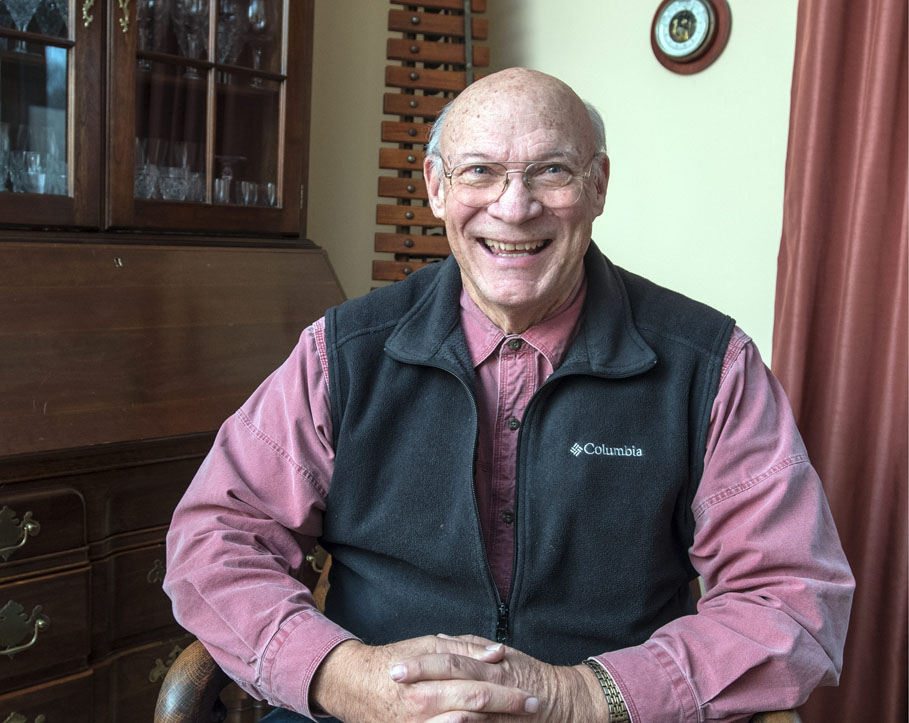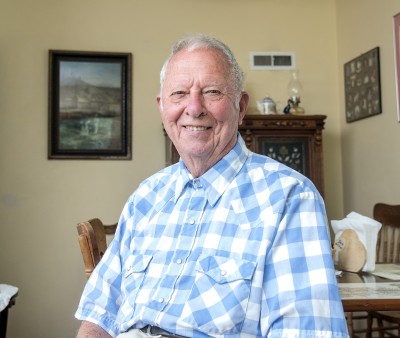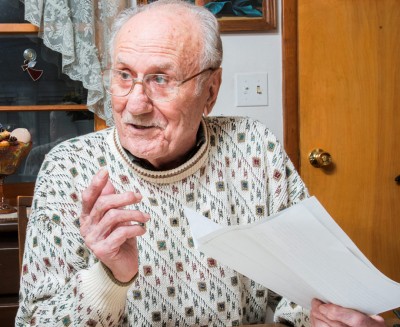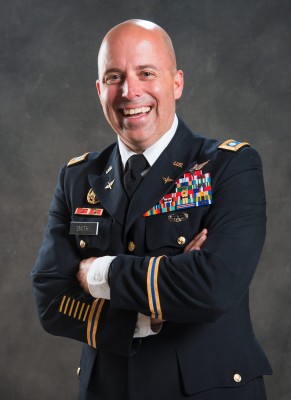Don Uchtmann
By Paul Wood

Photo By Rick Danzl/The News-Gazette
URBANA — Don Uchtmann served in the Coast Guard, started law school while in the service and became a professor at the University of Illinois.
Lt. Uchtmann, now 72, grew up in Sparta, Ill., not far from the Mississippi River.
But he’s mostly a landlubber.
In the Coast Guard, “I learned to sail a desk quite well and to respect the seamanship skills of others,” he said.
Uchtmann values his experience during the Vietnam era, crediting it with building teamwork skills.
He flies the flag every day in his front yard.
Uchtmann had earned a bachelor’s degree in agricultural science at the UI in June 1968.
But President Lyndon Johnson had eliminated most graduate school deferments only months before.
The future professor had already been accepted at the UI College of Law and for a master’s program in economics at the University of Leeds in England.
When he realized there was a nearly zero percent chance of attending graduate school in the fall of 1968, “the Coast Guard came to mind and became my preferred choice for fulfilling my military obligation.”
He applied to Officer Candidate School and was accepted.
Officer Candidate School candidates were either college grads or Coast Guard enlisted personnel who had been selected as strong candidates for a commission. Those who successfully completed the school received a commission as ensigns.
Uchtmann did temporary duty at Fort McClellan in Anniston, Ala., for Nuclear, Biological and Chemical Warfare Defense School, “the only Coast Guard officer in a class of mostly Navy guys.”
The skills could turn out to be vital.
“During military exercises, for example, I would create maps based on current weather data, showing the probable drift of radiation if Cleveland were hit by a nuclear weapon. Fortunately, such an attack never came,” Uchtmann said.
He was also the range officer for the 9th Coast Guard Small Arms Training Program for two summers.
Small arms training was important in his branch of service for reasons dating back to the War of 1812.
Under the treaty that ended the war of 1812, the Great Lakes were “demilitarized.”
“Armaments on naval vessels of both the U.S. and Great Britain (later Canada) with home ports on the Great Lakes would be limited — no heavy weapons, only small arms,” Uchtmann explained.
Uchtmann was a military aide for two years for Coast Guard admirals, successive commanders of the 9th Coast Guard District, with his duties “generally limited to ceremonial occasions.”
“It was very good experience for someone who might become a career officer in the Coast Guard, but that did not become my path,” he said.
Uchtmann was able to attend law school at night for two of his three years on active duty.
He “worked very hard, 100 percent to the Coast Guard during the week, and nearly 100 percent to study law on nights and weekends.”
He completed law school at Cleveland State University in 1974, three months early.
“Had I continued in the Coast Guard for my career, I probably would have been assigned to a Coast Guard legal office, but that was not my path,” he said.
That year, he returned to Urbana as a faculty member in the Department of Agricultural Economics, combining his studies of law, economics and agriculture.
“Perhaps the greatest lesson I learned from my Coast Guard experience was that life often does not unfold exactly as we have planned, that we need to adapt and make the best of the unexpected circumstances we encounter, that doing one’s best in whatever endeavor we find ourselves is probably a wise strategy, that working with good people is a real blessing and that a fair share of luck along the way is very welcome,” Uchtmann said.
Do you know a veteran who could share a story about military service? Contact Paul Wood at pwood@news-gazette.com.
Read more stories from local veterans:
 Don Saupe
URBANA — Apparently, silence is golden in the Army. Don Saupe was on a troop ship in the Pacific when the end of World W …
Don Saupe
URBANA — Apparently, silence is golden in the Army. Don Saupe was on a troop ship in the Pacific when the end of World W …
 Milford Ray Allen
URBANA — The Timberwolves were night soldiers, some of the toughest in World War II, and Milford Ray Allen was one of th …
Milford Ray Allen
URBANA — The Timberwolves were night soldiers, some of the toughest in World War II, and Milford Ray Allen was one of th …
 Randall Smith
CHAMPAIGN — Lt. Col. Randall Smith has learned to move fast. He was pulled out of embattled Kosovo in 2001 to move on to …
Randall Smith
CHAMPAIGN — Lt. Col. Randall Smith has learned to move fast. He was pulled out of embattled Kosovo in 2001 to move on to …